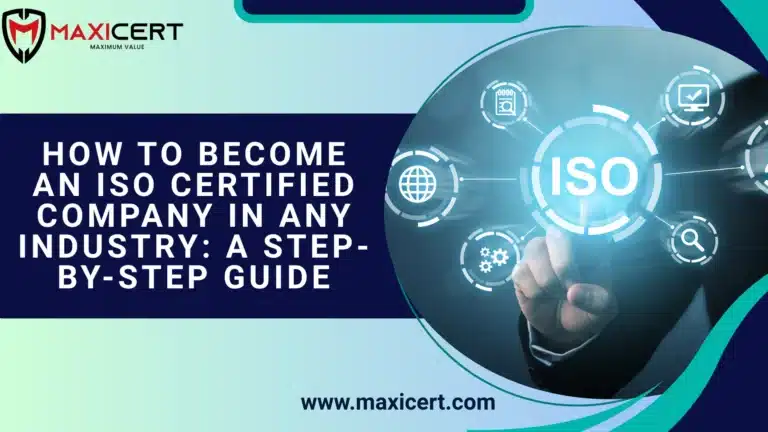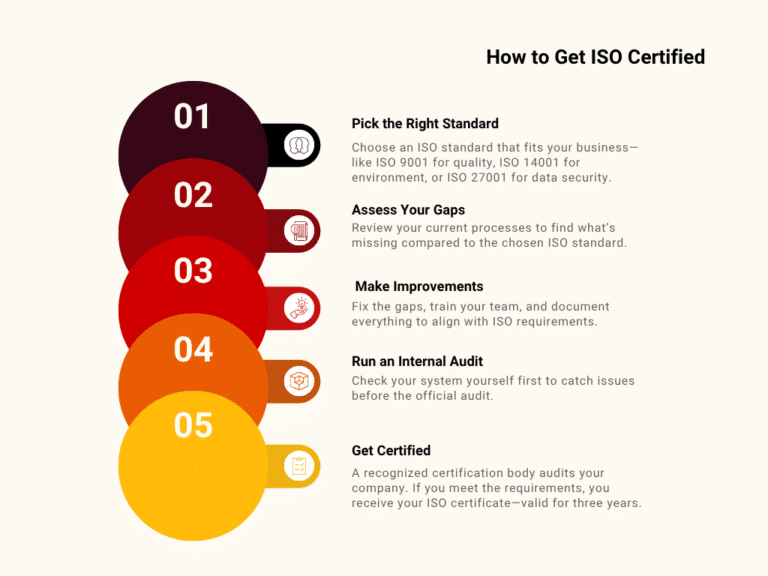How to Become an ISO Certified Company in Any Industry: A Step-by-Step Guide

Introduction
Trust and quality are something nobody can compromise on in today’s competitive world. Whether it’s a startup, a small growing business, or a large established enterprise, customers seek consistency, safety, and professionalism. This is where becoming an ISO certified company can play a crucial role.
ISO certification is not just a label—it’s an international seal of approval. It indicates that your business adheres to worldwide standards for quality, efficiency, and continuous improvement. But how do you actually become ISO certified? Is it hard? Is it only for big companies? Let’s demystify it all.What Does It Mean to Be an ISO Certified Company?
An ISO certified company is one which has passed an audit by an accredited certification body and proved compliance with a particular ISO standard. ISO, the International Organization for Standardization, creates global standards to help maintain consistency, safety, and efficiency in industries.
Being ISO certified reflects that your company works based on processes and procedures that comply with international requirements. It enhances your reputation, fosters customer confidence, and provides access to new markets. There are various ISO certifications based on what your business does—such as ISO 9001 for quality management, ISO 14001 for environmental practice, or ISO 27001 for data protection.
Learn more on the ISO official site.
Request A Free Quote
Advantages of Becoming an ISO Certified Business
Increased Customer Trust & Credibility
- Customers are more likely to have faith in companies bearing the ISO mark. It indicates that your company is quality- and professionalism-oriented.
Smoother Operations
- ISO standards make your internal processes streamlined. Teams perform more efficiently, errors decrease, and outcomes become more predictable.
Greater Market Access
- In most instances, ISO certification is a prerequisite to bidding on large contracts—particularly government or international contracts.
Better Decision-Making Through Data and Monitoring
- ISO standards encourage the use of performance metrics, audits, and regular reviews. This helps leadership make informed decisions based on data—not assumptions—leading to continuous improvement and smarter resource use.
Who Can Obtain ISO Certification?
One of the largest myths is that ISO certification is reserved for big businesses. The reality is, any business—big or small and from any industry—can become ISO certified. ISO standards are designed to be flexible, so they can fit the structure of startups, growing SMEs, or large corporations.
Here are a few real-world examples:
- A small bakery looking to ensure food safety and hygiene can get ISO 22000 certified.
- A tech startup handling user data can go for ISO 27001 to build trust around data security.
- A construction company bidding for government projects may need ISO 9001 or ISO 45001 to qualify.
- A fashion or garment factory can use ISO 14001 to reduce environmental impact and meet buyer expectations.
- A business consultancy or training institute may pursue ISO 9001 to boost their credibility and attract more clients.
Even freelancers and micro-businesses offering services (like design, training, or IT support) can adopt ISO standards to formalize their operations and gain a competitive edge.
In short, if you provide a product or service and want to build trust and grow, ISO certification can support that journey—no matter your industry or company size.
Step-by-Step: How to Get ISO Certified

ISO Certification Checklist
Here’s a quick recap of what you’ll need:
- Select the appropriate ISO standard
- Conduct a gap analysis
- Record your quality or management systems
- Train your staff
- Perform internal audits
- Plan and pass the external audit
- Ensure ongoing surveillance compliance
To learn more about how certification bodies work, check Wikipedia’s overview.
Avoid These Common Errors
Most companies make the ISO process more difficult than necessary. Be aware of these pitfalls:
- Selecting the incorrect standard
- Skipping on staff training
- Trying to do it all alone without professional assistance
- Selecting an unaccredited certifier
- Doing it as a one-off rather than an ongoing commitment.
For a trustworthy certifier, always choose one recognized by a national accreditation body like NABCB . We assist you in avoiding all these challenges by taking you through every step at Maxicert.
Synchronizing ISO with Current Systems and Certifications
If your business already follows frameworks like GMP, HACCP, or other local compliance programs, ISO certification won’t conflict with them. Instead, it complements and strengthens your existing systems.
Here’s how:
Manufacturers can integrate ISO 9001 or ISO 14001 seamlessly with Good Manufacturing Practices (GMP).
Tech or IT companies can align ISO 27001 with existing cybersecurity protocols or NDAs.
Food and agro-processors can combine ISO 22000 with HACCP and other food safety systems.
At Maxicert, we help companies streamline these integrations for more efficient audits and zero duplication of effort.
Why Choose Maxicert?
We simplify certification and make it hassle-free.
- Trusted experience in industries
- Local understanding + global best practices
- Help with documentation, training, and audits
- Fast turnaround with full compliance
- Trusted by businesses
Reach out to Maxicert today, We’re more than a certification agency—we’re your growth partner.
Conclusion
Becoming an ISO certified company is not just about following rules. It’s about building a stronger, smarter, and more trusted business.
Regardless of whether you work in manufacturing, healthcare, technology, logistics, or food processing, ISO certification provides you with the systems and credibility you require to expand.
Let Maxicert guide you through.
With step-by-step assistance, expert advice, and end-to-end service, we make it simple to become ISO certified across any industry.
Reach out to Maxicert today and arrange your complimentary consultation and initial step towards more robust business systems and international prestige.

Get In Touch

Get In Touch

Get In Touch
Need A Free Estimate?
Get a free consultation and Checklist to get certified for ISO , HALAL, CE Mark Certification.
FAQ
What is an ISO certified company?
It’s a firm that complies with global standards of quality, safety, or efficiency as attested to by an accredited certification body.
How do I become ISO certified?
Choose the correct ISO standard, close any gaps, revise your procedures, and successfully pass an audit by a certified authority. A consultant such as Maxicert can assist you.
How long does certification by ISO take?
Typically, between 1 and 6 months, depending on the size of your business and readiness.
Can small businesses obtain ISO certification?
Yes! ISO is applicable to any business size, including new businesses and small groups.





